Used in gang wars and kidnappings, these weapons exacerbate insecurity, which, coupled with poverty, drives citizens to flee to other countries. They are now being deported in large numbers by the Biden administration
Nearly every evening, the pleas of the victimized neighbors echoed throughout the neighborhood. Katiana Pierre was in her early twenties. Gang cruelty was rampant in La Plaine. Heavily armed, these men would enter homes, violate women, and take anything of value.
The young girl’s parents couldn’t bear it anymore. And one fine morning in 2017, they decided to send her, alone, to Chile.
Four years later, Katiana Pierre, with a black headband on her forehead and an adorable little girl in her arms, disembarked from a Boeing 737 with her Chilean partner, Joseph Metellus, at Toussaint Louverture Airport. Along with 327 other compatriots, they were part of the first wave of Haitians deported from the United States by the Biden administration. About 14,000 more are expected to return to the country in the coming weeks.
« Immigrants are fleeing the violence that the United States brings to them, » notes Eugenio Weigend, associate director at the American Progress think tank, well aware of this wave of deportations.
« If the USA wants to reduce immigration, one way to do it is to contribute to reducing violence outside their country, » explains Weigend. « And the best way to do that is to stop sending weapons that increase the lethality of conflicts. »
« The best way to [reduce immigration] is to stop sending weapons that increase the lethality of conflicts, » explains Weigend.
Haiti is in a perpetual state of crisis. Poverty, political turmoil following the assassination of President Jovenel Moise, and natural disasters make life unbearable. But, « the United States partially bears responsibility for what is happening in Haiti, » according to Weigend. « The USA provides a significant number of weapons to criminals operating in the region, such as Mexico in Central America or Caribbean countries. »
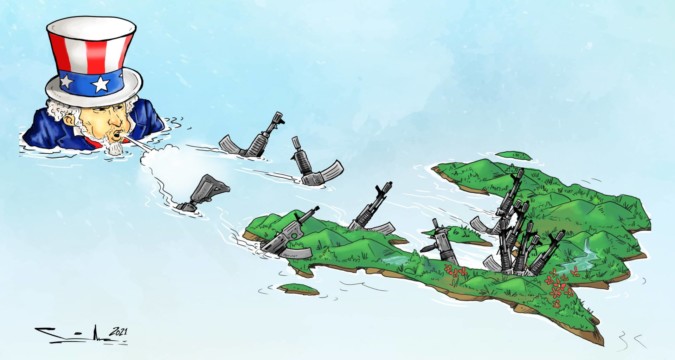
Drawing created for AyiboPost by Francisco Silva
Approximately 500,000 firearms are circulating in the country. Only 10% of which are legal.
Every year, the Haitian National Police (PNH) collaborates with the US Bureau of Alcohol, Tobacco, Firearms and Explosives (ATF) to gather key information about the buyer and the circumstances in which intercepted lethal equipment is exported, particularly in criminal operations.
« Among the firearms that are traced in Haiti, a large proportion come from the United States according to ATF data, » reports Eugenio Weigend. Two years ago, The American Progress released a report that explains « how the US’ weak gun laws fuel violent crime abroad. »
Often illegally imported, a good portion of this equipment ends up in the hands of criminals. Therefore, it remains difficult to have precise figures on the extent of the problem.
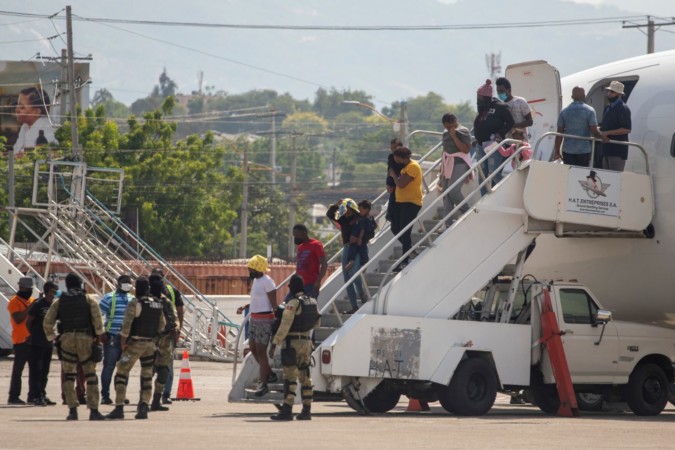
Haitians deported from the United States get off the plane at Toussaint Louverture airport, yesterday, September 19. Photo : Carvens Adelson
In 2012, the ATF was supposed to provide the PNH with information on 20 weapons. 85% were manufactured or imported from the United States. Out of the 206 questionable weapons in 2016, 98.5% came from the great North American neighbor, compared to 94.1% in 2019.
Haiti is not the only country to have an information exchange partnership with the United States. The Bahamas, Barbados, Jamaica, and the Dominican Republic regularly demand information from the ATF to solve crimes on their territory. And year after year, the United States tops the list of countries providing weapons in the region.
The Colt 45 or the 9mm makes one all-powerful. « Sometimes, the bandits would force mothers to sleep with their children, and sisters to sleep with their brothers in La Plaine, » says Katiana Pierre, during an interview with AyiboPost yesterday Sunday, at Toussaint Louverture Airport.
A secret group of institutions and state structures have a permit to legally import weapons from the United States. One of the specialists interviewed by AyiboPost reports that some of this equipment ends up on the black market when they are not used by the bandits.
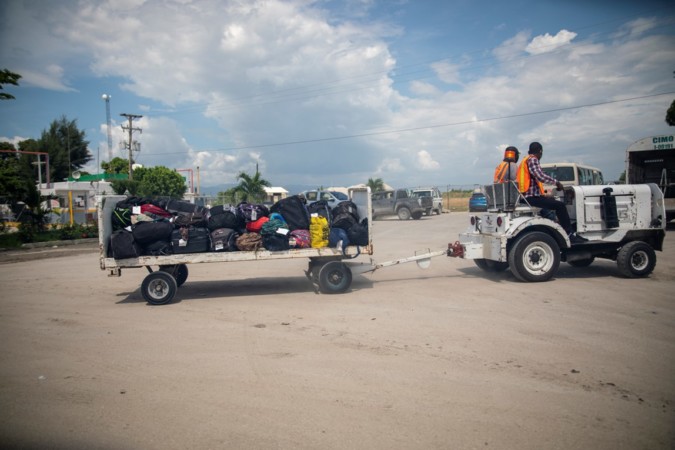
Baggage of deported Haitians. Photo : Carvens Adelson/AyiboPost
In December 2020, the US Embassy in Haiti was unable to transfer this list to AyiboPost due to « federal regulations. » Nor did the consular representation indicate whether steps were being taken to revoke the import permits of institutions whose weapons end up at crime scenes.
The embassy had « no comment » in response to a question regarding possible actions being implemented to curb the problem of weapons from the United States ending up in the hands of criminals in Haiti.
« Although the International Traffic in Arms Regulations does not regulate the purchase of weapons, it regulates the ability to export these weapons to Haiti, » US authorities explained to AyiboPost. « Specifically, the United States maintains a policy of denial regarding requests for authorization to export defense supplies or services to Haiti. This includes a limited case-by-case review policy for certain applications, such as those supporting security units operating under the command of the Haitian government or used by the United Nations. »
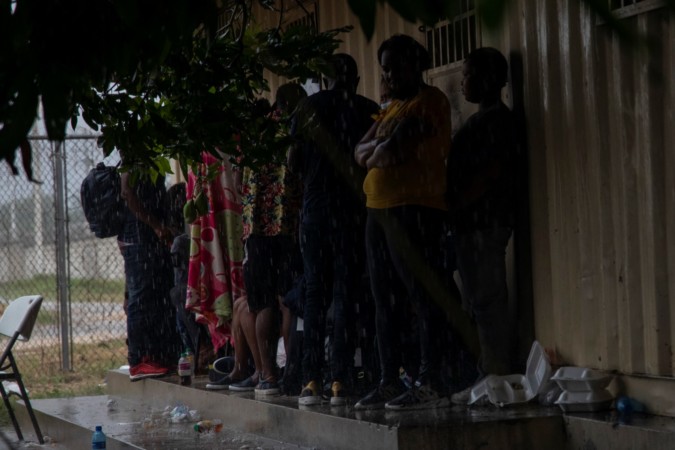
Haitians deported from the United States take shelter from the rain yesterday at Toussaint Louverture airport. Photo : Carvens Adelson/AyiboPost
When Katiana Pierre permanently closed the door to her house in Chile on July 12, the reasons for abandoning her well-paid job in a dental clinic were numerous.
Top of mind was her refusal to be vaccinated against the Coronavirus, as required by her employers. « The vaccine isn’t mandatory in the United States, so why should it be in Chile, » she wondered.
There was also “the opportunity to see her mother again who lives in Miami and whom she has not embraced for several years.”
One Monday, Katiana Pierre took her daughter in her arms, and with her partner, they embarked on “Death Road” to head towards the American Eldorado.
Boat, bus, exhausting hikes… the month-long journey to Mexico tests nerves and muscles.
The month-long journey to Mexico tests nerves and muscles.
“People were swept away by the waters, says Katiana Pierre. Others fell off cliffs. A lady I know was robbed in the woods with her husband. Her husband’s stomach became swollen from drinking dirty river water. We spent six days walking in a forest between Colombia and Panama.”
$12,000 later, the little exhausted family was in Texas. “We spent 6 days there under a bridge. Then 4 more in prison, says Katiana Pierre. The American authorities threw away our toothbrushes and toothpaste. We couldn’t take a bath or brush our teeth until they deported us. They subjected us to inhumane and degrading treatment with a child in our arms.”
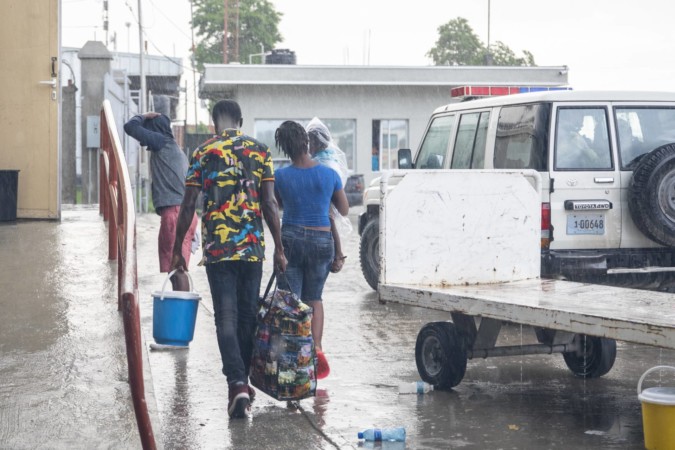
Haitians expelled from the United States in the rain yesterday at Toussaint Louverture airport. Photo : Carvens Adelson/AyiboPost
Pierre’s partner, Joseph Metellus, has been living in Chile for 6 years. He planned to return there within a week at the latest. What bothers him is not deportation itself. « I regret the treatment inflicted on Haitians in the United States, he says. Other nations in irregular situations are not treated in this way, » adds the young man. He was earning $1,000 per month as the leader of a handling team at a company in Chile.
According to figures compiled by the Center for Research and Analysis in Human Rights, 31 cases of kidnappings were recorded, with 27 in Croix-des-Bouquets, in September, coinciding with the assassination of Jovenel Moïse. This objective decline will be short-lived. There were 73 cases reported for August and another 71 for just the first three weeks of September.
Approximately 20,000 citizens have fled their homes since June due to armed conflicts in the capital, Port-au-Prince.
When the serial number of the weapon used in a crime is not altered, the ATF allows for precise information to be traced, including the name of its last owner and the circumstances of its exportation.
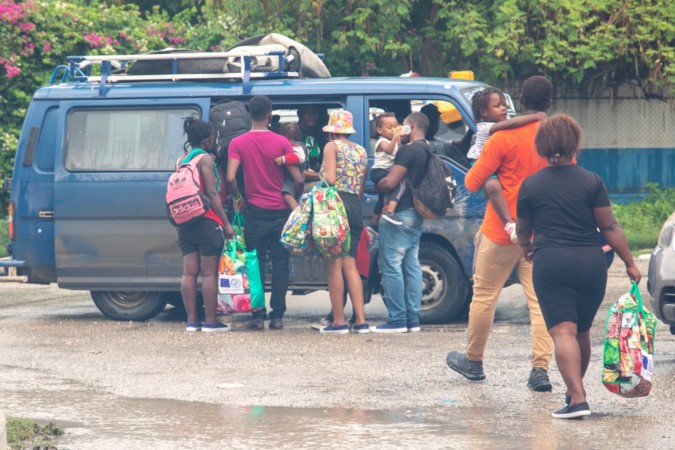
Deportees from the United States take a bus home. Photo : Carvens Adelson/AyiboPost
Haitian authorities are failing to control the country’s borders and customs, and it remains too easy to legalize weapons in the country, experts say.
Additionally, the PNH does not make sufficient use of the possibilities for tracing weapons. According to reports, Haiti is among the countries with the fewest requests for weapons information from the ATF. When Trinidad and Tobago, with barely a million inhabitants, requested information on 229 weapons in 2019, Haiti, with more than 10 million inhabitants and significant crime, had only submitted requests in 51 files.
Requests to the PNH for an explanation on this state of affairs have been unsuccessful. One likely hypothesis is the lack of productivity on the part of police investigation units, resulting in fewer weapons being seized.
Until they deported us, we couldn’t take a bath or brush our teeth. They subjected us to inhumane and degrading treatment with a child in our arms.
Reginald Delva is a security expert and former Minister of the Interior. He speaks of “complicity and collusion,” to explain the few weapons traced by the PNH. “Too many authorities are involved in the question of security,” adds the former secretary of state who affirms that many of the country’s security companies belong to serving police officers, or former soldiers.
Collecting information on actual importers could reveal compromising information that would embarrass the institution or high-ranking individuals authorized to legally import weapons into the country.
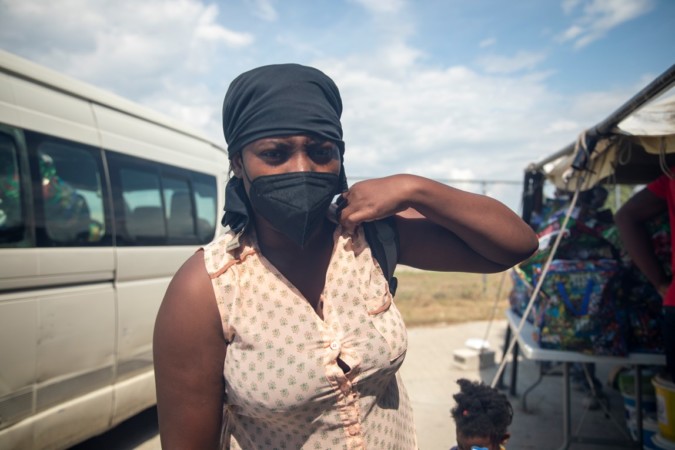
“We were going to the United States because we wanted to go further,” reports Katiana Pierre. Life was good in Chile. I found work there. I felt free for the first time. » Photo : Carvens Adelson
But a significant part of the problem lies outside the borders of Haiti. In recent years, the production and importation of weapons from the United States has increased substantially, according to Eugenio Weigend of the American Progress think tank. This country also has very weak gun control laws.
« Almost anyone can buy a gun in the United States, » Weigend laments. « According to federal law, those with a firearms sales license must conduct background checks on individuals seeking to purchase a gun. However, these checks are hardly necessary at gun shows. Those prohibited by law go to these places to acquire weapons. »
The influx of assault weapons produced in the United States into Haiti contributes to the worsening climate of insecurity, which in turn drives professionals, young and old, to leave the country. « We went to the United States because we wanted to go further, » Katiana Pierre reports. « Life was good in Chile. I found work there. I felt free for the first time. »
Cover Image: Drawing created for AyiboPost by Francisco Silva
English translation by Sarah
Stay in touch with AyiboPost through :
► Our WhatsApp channel : click here
► Our WhatsApp Community : click here
► Our Telegram canal : click here

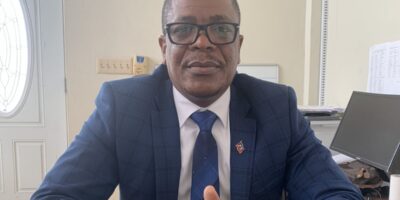
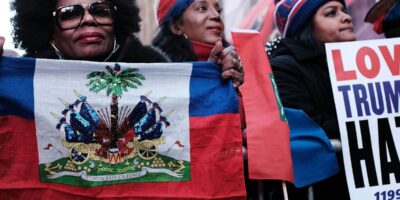



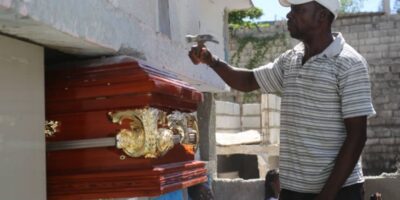
Comments